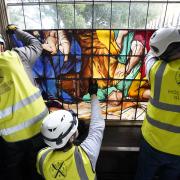Investigative journalism is commonplace today. Sometimes the methods employed can be dubious in the pursuit of a story, scoop or just the truth. A pioneering journalist, publisher and editor, W. T. Stead (1849-1912) was at the forefront of this approach to reporting the news but fell victim to his own controversial methods. He’s a draw for the mawkish as not only did he serve a prison sentence, he also died in that most famous maritime disaster, the Titanic sinking.
William Thomas Stead, or W.T. Stead, was born in Northumberland on July 5, 1849. He was the son of Rev. William Stead Snr., an impoverished yet respected Congregationalist minister, and Isabella née Jobson who provided what culture there was. William Jnr. was largely home educated on Bible studies although he was also quite able in Latin apparently. Isabella undoubtedly had a strong influence on William. A caring doer, she caught his imagination when she campaigned against the government’s prejudicial Contagious Diseases Act. The future campaigning journo was probably galvanised right there. Stead was further educated in Wakefield (1862-64) after which he was apprenticed to a merchant’s office/counting house in Newcastle where he undertook clerical duties.

Stead moonlighted, writing for The Northern Echo, a relatively new liberal paper in Darlington, from 1870, when he was around 21 and the following year (1871) became its editor aged just 22, the youngest newspaper editor in the country. It was a position he’d hold until 1880. Whilst a Darlington editor, Stead was married, in 1873, to childhood sweetheart, Emma Wilson, with whom he’d have half-a-dozen children. He was banging out his editorials when there was much to rage about: the Industrial Revolution had left considerable collateral damage. From the outset Stead used the power he’d been given to fight for those with no voice. We shouldn’t mistakenly think Stead was totally liberal though. He favoured the death penalty and was suspicious of the vote being extended to the poor.
Stead headed for London in 1880 to work on the Pall Mall Gazette until 1889, firstly as assistant editor, then as editor from 1883. During this period, he launched a series of highly influential campaigns, including exposés on slum housing and underinvestment in the Royal Navy. It was Stead’s innovative approach that really launched today’s tabloid press which in a sense continues to honour the man by not just reporting the events making the headlines but also digging deep, campaigning vociferously and writing sensationally. They are the influencers of the print medium, and it was Stead who seems to have been first latching on to the essential truth that newspapers could shift public opinion as well as government policy. He promoted ‘Government by Journalism’, the premise being that editors knew what was in everyone’s best interest. Stead livened up the Gazette with interviews and illustrations. Not everyone approved. Poet Algernon Swinburne dismissed it as the ‘Dunghill Gazette’.

He’d also serve three months in prison though for the so-called ‘Maiden Tribute of Modern Babylon’ series of articles published in 1885 and the infamous Eliza Armstrong case. The articles were written in support of a bill, later dubbed the ‘Stead Act’ (Criminal Law Amendment Act, 1885) that raised the age of consent from 13 to 16. Stead challenged people to tackle articles they would find uncomfortable reading. It was Stead’s unconventional methods that landed him in clink though. He staged the purchase of 13-year-old Eliza, a well-intentioned but ill-conceived scheme to show how easy it was to ‘acquire’ a young girl but left himself open to prosecution, ironically the first victim of his own campaign. Stead sailed close to the wind several times as he reported not only on child welfare but also on the reform of the nation’s criminal code and equally vital social legislation. Some of his causes made him a figure of hate for some, including powerful vested interests.
In 1886 Stead wrote a short story about a sea collision made worse by a shortage of lifeboats. He followed this in 1892 with another, similar tale, when survivors are rescued after a ship hits an iceberg. Considering his ultimate fate this was prescient. Stead gave up daily news reporting, establishing his monthly periodical ‘Review of Reviews’ (1890) and working diligently for international peace, political reform, spiritualism, a ‘civic church’ and cordial relations with Russia as well as ending child prostitution. In 1893 he pursued another passion by founding and editing the spiritualist journal ‘Borderland’. In 1894 Stead travelled to Chicago for the World’s Fair and was aghast at the poverty existing alongside the glitz. His findings, published after a detailed investigation, represented an early example of journalistic research. His title began: ‘If Christ came to Chicago!’ A later attempt to found a newspaper, ‘The Daily Paper’ (1904), was a failure and he narrowly avoided bankruptcy. As well as a London home Stead also lived at ‘Hollybush House’, 30 Selsmore Road, South Hayling, Hayling Island, which had been his summer home since 1895 and is today a desirable private residence; there’s a plaque on the building. South Hayling, formerly ‘Southwood’, was a developing seaside village-cum-town.
Stead’s life ended tragically when he drowned in the Titanic disaster on April 15, 1912. He wouldn’t have travelled far to board the supposedly unsinkable liner. It was from Hayling he’d left for Southampton. He’d been a 1st Class passenger bound for a peace rally. It’s said he’d been in fine form that last night before retiring to bed around 22.30. After the berg was struck, Stead was seen assisting women and children into lifeboats before giving up his lifejacket for the benefit of another. One eyewitness claimed to have seen Stead holding on to a raft in the freezing waters; his body was never recovered. He was just one of some 1,500 passengers and crew that perished. Stead had been several times nominated for the Nobel Peace Prize; it had been thought he may have been the 1912 winner had tragedy not struck in the North Atlantic. William Stead’s daughter contributed a life of him (1913). His interests included cycling, playing with the children and ironically boating.

CHRONOLOGY
1849 – William Thomas Stead born in Embleton, Northumberland (July 5).
1871 – Becomes editor of The Northern Echo aged just 22.
1873 – Marries Emma Wilson with whom he’d have six children.
1880 – Moves to London to become assistant editor then editor of the Pall Mall Gazette.
1885 – The ‘Maiden Tribute of Modern Babylon’ series of articles sees Stead imprisoned.
1890 – Establishes his monthly periodical ‘Review of Reviews’.
1894 – Stead travels to Chicago for the World’s Fair and reports on the squalor he sees.
1895 – Acquires Hollybush House, South Hayling, as a summer home.
1912 – Death of W.T. Stead in the Titanic disaster, April 15, aged 62.



























